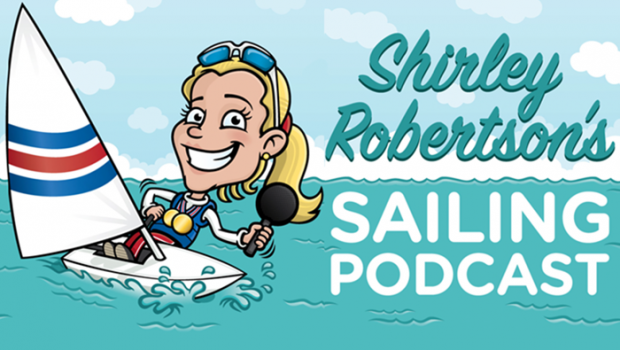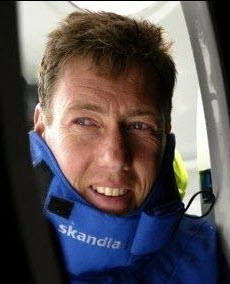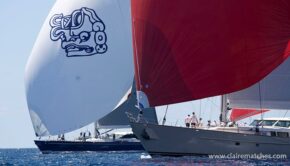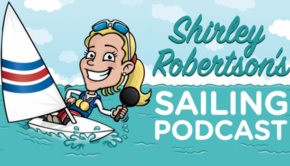Sitting down with Nick Moloney
Published on May 5th, 2020
Shirley Robertson kicks off Season 2 of her Sailing Podcast with an insightful two part interview in celebration of the eighteen year anniversary of the day Aussie Nick Moloney won the Jules Verne Trophy.
It was on May 5th 2002 that Moloney, on board Bruno Peyron’s catamaran ‘Orange’, crossed the finish line as one of thirteen onboard the record breaking circumnavigation. The non-stop blast around the planet had taken 64 days 8 hours and 37 minutes, and for Moloney, sailing with French offshore legend Bruno Peyron was just one of many highlights in an incredible voyage…
“Bruno had a lot going on….so you didn’t see a lot of him, but whenever you were out of control, which was pretty often in those boats, before we knew it, before we actually knew we were out of control, he’d put his wet weather gear on, his harness on, and as soon as the situation got critical he appeared like a fairy, and just grabbed the helm, laid down command and got the situation back in control immediately, and that for me was absolutely amazing.
“I remember getting the trophy, and having said to myself ‘I’m gonna put my name on that trophy’, everyone’s name’s on the base…..and the trophy itself is this chrome canoe body suspended on a magnetic field…..and when the (black silk sheet) dropped off the base, my name was right there! It was so emotional!”
Success in the Jules Verne came at a time when Moloney had been making a name for himself in Europe in the competitive world of offshore sailing. His route to the round the world record though, was a star studded one.
In similar fashion to many of his Australian peers, Moloney’s career was given an early boost by the talent spotting of the legendary Syd Fischer, who initially invited the young sailor into his 1992 America’s Cup campaign “Challenge Australia”. Moloney then talks of his time at the same Cup with the Italians, ‘Il Moro di Venezia’ under Paul Cayard, before sailing for John Bertrand’s 1995 Cup campaign “oneAustralia”.
The pair then discuss Maloney’s excitement at being called up to sail on Dennis Connor’s 1997 Whitbread Round the World Race entry “Toshiba”, a boat with, at the time, one of the most phenomenally experienced crews to have ever attempted the race.
More recently, Moloney and Robertson both held key roles as skippers in the fledgling Extreme 40s Series, the groundbreaking, fast catamaran series that paved the way for inshore, ‘stadium’ style racing. Their recollections are of wild early days, racing fast boats in small spaces, with the inevitable collisions and dangers of the new sport pushing them all to their limits.
But it was offshore that Moloney’s calling was strongest. A tight business alliance with Ellen Macarthur flourished, and set Moloney on an inevitable collision course with the solo sailor’s ultimate challenge, the toughest race on the planet, the Vendee Globe.
It’s his honest and at times brutal accounts of his exploits alone at sea that are the highlight of this podcast, confessing how at times, he hated the noises, the movements, everything about being at sea, confronting near death experiences with the honest and matter of fact approach of a man that knows things could have ended very differently.
It’s a compelling listen, but there’s also a passion and transparent emotion in Moloney’s story telling that is no more obvious than when he tells of his voyage back into Les Sables d’Olonne, having failed to complete the non-stop Vendee Globe course…
“I remember coming in towards Les Sables d’Olonne, and this fishing boat’s coming towards me and sounding his horn and all the rest of it and the guy comes very close, and the fisherman’s hanging out the door with a newspaper and I’m thinking something has happened, something political has happened, and he’s just letting me know, and sure enough it was me on the front of the newspaper, and I didn’t know.
“And I got closer to the coast, all these yachts were out off Les Sables d’Olonne, and I’m thinking they’re doing twilight races and hopefully I don’t get in the way, and sure enough as I get towards what would have been the finish line and all these boats turn and started to come with me. And yeah, it was full on, thousands of people on the dock in Les Sables, I feel like I got a better reception than if I had finished the race.”
This edition of the podcast is in two parts:
Shirley Robertson OBE made history by becoming the first British woman to win Olympic Gold Medals at two consecutive Olympic Games. Shirley Robertson’s Sailing Podcast, produced and edited by Tim Butt of Vertigo Films, is available to listen on her website or via most popular podcast outlets, including iTunes, Spotify, Google Podcast, and aCast.









 We’ll keep your information safe.
We’ll keep your information safe.